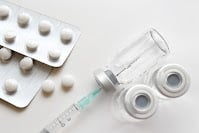Naltrexone-Bupropion Combination Found To Reduce Methamphetamine Use Over 12 Weeks.

Individuals with methamphetamine use disorder treated with a combination of injectable naltrexone and extended-release bupropion gradually declined their use of methamphetamine over 12 weeks at a rate that was significantly greater than patients receiving placebo, according to a report in Addiction.
The report is a follow-up analysis of the Accelerated Development of Additive Pharmacotherapy Treatment for Methamphetamine Use Disorder (ADAPT-2) trial; the primary results reported the effectiveness of the combination treatment over six weeks.
Lead author Michael Li, M.D., of the Center for Behavioral and Addiction Medicine at the University of California, Los Angeles, and colleagues noted that methamphetamine and other amphetamine-type stimulants account for the second largest class of substances used by people globally. Over the past decade, overdose deaths due to methamphetamine have increased about fivefold in the United States, and there is currently no approved medication to treat methamphetamine use disorder, they wrote.
In ADAPT-2, 403 individuals with methamphetamine use disorder were randomized to receive either 380 mg injectable naltrexone every three weeks plus 150 mg extended-release bupropion weekly or placebo for 12 weeks; after six weeks, some placebo participants were randomly switched to the combination treatment. The primary outcome was decrease in methamphetamine use as defined by negative urine tests. Urine samples were obtained twice weekly during treatment, then once on week 13 and 16 post treatment. The study was carried out at multiple U.S. centers that are part of the National Institute on Drug Abuse Clinical Trials Network.
Participants receiving the combination treatment over 12 weeks had about an 18% increase in negative urine tests after the first six weeks, and a further 9% increase in negative urine tests during the second six weeks for a total increase of 27% over the 12-week period. In comparison the number of negative urine tests increased by about 11% for those receiving placebo in that same period.
Urine tests at week 13 and 16, after treatment had ended, showed no significant difference between the two groups, suggesting that the decrease in methamphetamine use during the 12 weeks was due to treatment.
“Prior stimulant use disorder treatment trials suggest that change in use is gradual (consistent with our findings), unlikely to result in sustained abstinence in a typical 12-week trial, and dependent on treatment duration,” wrote Li and colleagues. “This warrants future clinical trials to quantify changes in [methamphetamine] use beyond 12 weeks and to identify the optimal duration of treatment with this medication.”
For related information, see the Psychiatric News article “Naltrexone-Bupropion Combination May Reduce Methamphetamine Use.”
(Image: Getty Images/iStock/Ca-ssis)
Don't miss out! To learn about newly posted articles in Psychiatric News, please sign up here.





